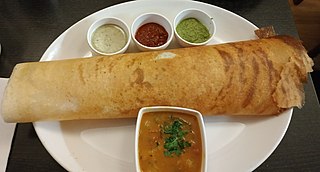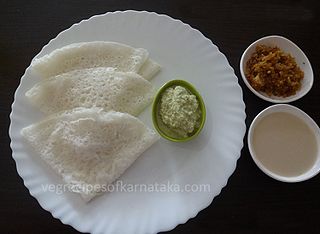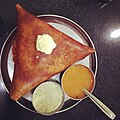Indian cuisine consists of a variety of regional and traditional cuisines native to the Indian subcontinent. Given the diversity in soil, climate, culture, ethnic groups, and occupations, these cuisines vary substantially and use locally available spices, herbs, vegetables, and fruits.

A dosa is a thin savory crepe in South Indian cuisine made from a fermented batter of ground black gram and rice. Dosas are served hot, often with chutney and sambar. Dosas are popular in South Asia as well as around the world.

Punjabi cuisine is a culinary style originating in the Punjab, a region in the northern part of South Asia, which is now divided in an Indian part to the east and a Pakistani part to the west. This cuisine has a rich tradition of many distinct and local ways of cooking.

Pakora is a fritter originating from the Indian subcontinent. They are sold by street vendors and served in restaurants in South Asia. It consists of items, often vegetables such as potatoes and onions, coated in seasoned gram flour batter and deep fried.

Tamil cuisine is a culinary style of Tamil people originating in the southern Indian state of Tamil Nadu and neighboring Sri Lanka. Meats, along with rice, legumes, and lentils, are also popular. Dairy products and tamarind are used to provide sour flavors. On special occasions, traditional Tamil dishes are served in a traditional manner, using banana leaves in place of utensils. After eating, the banana leaves are then used as a secondary food for cattle. A typical breakfast meal consists of idli or dosa with chutney. Lunch includes rice, sambar, curd, kuzhambu, and rasam.
Maharashtrian or Marathicuisine is the cuisine of the Marathi people from the Indian state of Maharashtra. It has distinctive attributes, while sharing much with other Indian cuisines. Traditionally, Maharashtrians have considered their food to be more austere than others.
Udupi cuisine is a cuisine of South India. It forms an important part of Tuluva cuisine and takes its name from Udupi, a city on the southwest coast of India in the Tulunadu region of the state of Karnataka. Udupi cuisine is strictly vegetarian and has its origin in the Udupi Sri Krishna Matha founded by Madhvacharya. The cuisine was developed by Madhva Brahmins to offer different kinds of food to Krishna at the Udupi Krishna Temple. Hence, Udupi cuisine is also synonymously known as Madhva cuisine.

Indian breads are a wide variety of flatbreads and crêpes which are an integral part of Indian cuisine. Their variation reflects the diversity of Indian culture and food habits.

Neer dose, literally meaning water dosa in Tulu, is a crêpe prepared from rice batter. Neer dosa is a delicacy from Tulu Nadu in India and a part of Mangalorean cuisine.
Bhojpuri cuisine is a style of food preparation common among the Bhojpuri people of Bihar and eastern Uttar Pradesh in India, and also the Terai region of Nepal. Bhojpuri foods are mostly mild and tend to be less hot in terms of spices used. The cuisine consists of both vegetable and meat dishes.

Bisi bele bhath or bisi bele huliyanna (ಬಿಸಿಬೇಳೆಹುಳಿಯನ್ನ) is a spicy, rice-based dish with origins in the state of Karnataka, India. It is said to have originated in the Mysore Palace and it took a 100 years for the dish to come out of the palace kitchens and another 200 years to spread across the state of Karnataka.
Konkani cuisine is the cuisine of the Saraswat Brahmins from the Konkan region on the western coast of India. Konkani cuisine differs within the Saraswat Brahmin subsects and within the Konkan-Canara region. Konkani cuisine originally hails from the Konkan region including Uttara Kannada, Udupi district, Dakshina Kannada, Damaon, and Goa, India. Konkani cuisine is popular served in many restaurants throughout the western coast of India, and especially in the cities of Bombay and Bangalore. Each variation has its unique flavour and makes uses of different vegetables and fruits available in the region. Konkani cuisine is usually pesco-vegetarian, except acharyas and purohits who follow a strictly saatvik vegetarian diet. According the Konkani folklore, fish, meats are regarded as sea vegetables. Historically, they have refrained from eating any terrestrial animals in general.

Andhra cuisine, culturally known as Telugu cuisine, is a cuisine of India native to the state of Andhra Pradesh and is the culinary style of Telugu people. It is generally known for its tangy, hot, and spicy taste.

Malaysian Indian cuisine, or the cooking of the ethnic Indian communities in Malaysia, consists of adaptations of authentic dishes from India, as well as original creations inspired by the diverse food culture of Malaysia. Because the vast majority of Malaysia's Indian community are of South Indian descent, and are mostly ethnic Tamils who are descendants of immigrants from a historical region which consists of the modern Indian state of Tamil Nadu and Sri Lanka's Northern Province, much of Malaysian Indian cuisine is predominantly South Indian inspired in character and taste. A typical Malaysian Indian dish is likely to be redolent with curry leaves, whole and powdered spice, and contains fresh coconut in various forms. Ghee is still widely used for cooking, although vegetable oils and refined palm oils are now commonplace in home kitchens. Before a meal it is customary to wash hands as cutlery is often not used while eating, with the exception of a serving spoon for each respective dish.

Punugulu(పునుగులు) or Punukkulu is a snack and common street food in Vijayawada, Guntur and a few coastal districts of Andhra Pradesh. Punugulu is a deep-fried snack made with rice, urad dal and other spices. They are often served with peanut chutney, known as palli chutney, coconut chutney, tomato chutney, verusanaga chutney or toordal chutney known as Kandhi Pachadi, or they can be served with capsicum peanut chutney. They are also very popular in Hyderabad.

Street food, as in other areas of India, are popular in Chennai, despite the common belief in India that street food is unhealthy. The idly sambhar is a popular dish, which is served as breakfast or dinner. Apart from regular South Indian street food, the city's streets are also filled with several North Indian street food outlets, most of them established by North Indian migrants themselves. Gujarati and Burmese are also available. Street food in Chennai is so popular that a game had developed based on the TV show The Amazing Race where contestants have to follow clues to street-food spots in the city.

Masala dosa, also called masale dosey, is a South Indian dish. It is a type of dosa and has its origin in the town of Udupi in Karnataka. It is made from rice, lentils, urad dal, chana dal, fenugreek, puffed rice, toor dal and dry red chilli, and served with potato curry, chutneys, and sambar. It is popular in South India, but can be found in all other parts of the country and overseas. In South India, the preparation of masala dosa varies from city to city. There are variations in Masala dosa like Davanagere butter dosa and paper masala dosa.

Pesarattu,pesara attu, pesara dosa, or cheeldo is a crepe-like bread, originating in Andhra Pradesh, India, that is a variety of dosa. It is made with green gram batter, but, unlike a typical dosa, it does not contain urad dal. Pesarattu is eaten as breakfast and as a snack in Andhra Pradesh. It is typically served with ginger chutney, peanut chutney or tamarind chutney. Green chilies, ginger and onions are used in variants.

Vada or Vadai is a category of savoury fried snacks native to India. Vadas can be described variously as fritters, cutlets, or dumplings. Alternative names for this food include vadai, vade, and bada. Vadas are sometimes stuffed with vegetables and traditionally served with chutneys and sambar.



















